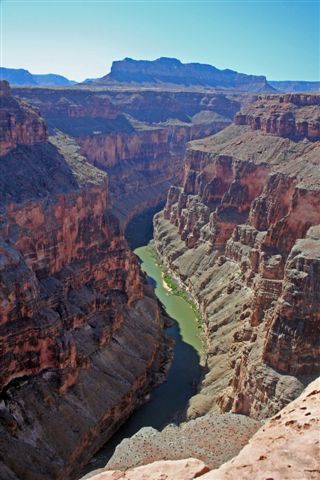The Resource
Introduction
The world’s premier white-water wilderness experience is unleashed in a 277-mile stretch of the Colorado River as it passes through one of the most formidable canyons on the face of the earth. The fluvial processes of the Colorado River are responsible for cutting the cavernous gorge that exposes rocks from the bowels of the earth two billion years old. The Colorado River has created one of the Seven Natural Wonders of the World and a World Heritage Site that draws pilgrims from around the world.
There are few places left in this nation where the opportunity exists to face situations similar to those of early American explorers. This wilderness provides the opportunity to rigorously challenge ourselves and connect with nature on its own terms. The stretch of the Colorado River within the park is unique in that it flows through one of the most spectacular, wild landscapes in the nation and can provide a world-class multi-week wilderness experience if human use is managed properly. We believe protection of the wilderness character of the river is essential to the integrity of the Grand Canyon region.
The Ecological Necessity of Wilderness
Wild ecosystems have always been the source of life on this planet, the place where organisms have developed, diversified and evolved. Until comparatively recently the entire earth was wild. The purpose of the Wilderness Act was to preserve the remaining areas within our country that “retains (their) primeval character and influence.” At least in part, it is because these places are the only places that allow biological diversity to continue to develop at a natural pace.
Large wilderness areas provide the best spaces for a relatively intact array of biota. They can protect natural life and natural processes not only by isolating them from the direct effects of human development that divide and alter ecosystems – roads, dams, river channelization, extractive development – but also from indirect effects, such as poor air and water quality and unnatural noise. They provide the large, uninterrupted spaces required by large predators, and the unique microclimates that have nurtured rare plants and microorganisms. It also provides a setting that allows for the sustenance and rejuvenation of the system. Wilderness permits the dynamic responsible for the diversity of species. Wilderness may be among the last places where evolution still operates without significant human impact. It is not just about preserving what has existed, but providing the opportunity for future natural change.
The Spiritual Character of Wilderness
The preservation of wilderness character is the paramount directive of the Wilderness Act. By selecting the word ‘character,’ the authors of the Wilderness Act chose to protect more than the tangible qualities of the landscape. In fact, Howard Zahniser, the Act’s primary author, consciously imbued the conservation goals of this legislation with spiritual underpinnings. Zahniser, the son of a minister, derived much of his ideology from the writings of Henry David Thoreau who found heaven on earth by communing with nature.
The secular expression “wilderness character,” found in the statutory language of the Act, recognizes that wilderness provides the unique experience of transcending the physical attributes of the land. The preservation of wilderness is in fact, the preservation of a spiritual experience, which derives its power from the land and includes exposure to inherent risks.
Transcendence is the essential experience aspired to by practitioners of every faith. It is through such an experience that we are allowed the opportunity to enlarge our perspective, fully open our hearts and exist with something far greater than ourselves. The transcendental experience allows us to exceed the limits of our humanness and merge, if only briefly, with the divine.
The transpersonal encounter is rooted in silence whether it is in a man-made structure or one carved by Nature. It is the silence that is the foundation of prayer and meditation and the gateway to the ultimate spiritual experience. It is the silence that allows us to attain tranquility, disengage from our normal activities, draw energy from the earth and admit a greater power to renew and sustain us.
It is for this reason that wilderness is not just another type of recreational opportunity. It is profoundly unique in that it provides a deep, spiritual connection through a personal experience with the raw, primeval forces that have molded our planet. For those who quest to connect with the basic force of life, a wilderness experience is as essential as communion is to the parishioner.
From: Grand Canyon Wilderness Alliance Colorado River Management Plan Scoping Comments, 2002
Click here to return to The Place page.
